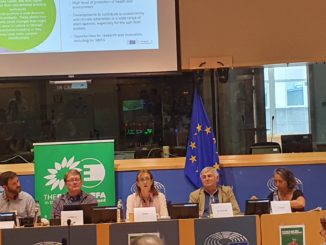A few days ago, the Romanian Parliament approved a law proposal which would permit the cultivation of genetically modified organisms (GMOs) in the countries’ protected areas which are part of the Natura2000 network. Currently 22.68% of Romania’s surface is protected through this European wide conservation network.

Some of the most recent independent studies show that GMOs, and the pesticides associated with their cultivation, have a number of unanticipated negative effects on biodiversity and our health. The toxins produced by GMOs as well as the glyphosate used in their cultivation (for herbicide-tolerant plants) have a destructive impact on wild flora and fauna, water and soil.
Protected natural areas, including the Natura2000 sites, are the last refuge for biodiversity. GMOs are novel plants, created in laboratories, many of their effects still unknown – needing much more long-term research to be identified and defined.
It is unacceptable that Romanian politicians have approved this law proposal, through which GMOs could be cultivated on protected areas defined by European Directives; Alexandru Riza of Greenpeace Romania referred to the act as “completely irresponsible”.
The interest of Romanian farmers towards GMOs is decreasing year by year. In 2013 there were only two companies cultivating GM maize in the country. The Government also has mixed feelings about them. Although the Agricultural Ministry supported GMOs at the previous debates in the Committees, the Environment and Climate Change Ministry opposed.
Considering that the law was not debated enough and the environmental protection NGOs and other interested organizations could not expose their views, the Romanian Environmental Coalition appeals to the Romanian Presidency to request the resubmission of the law into the Parliament.
Daniel Constantin, Romanian Minister for Agriculture and Rural Development, declared for Green Report:
“I don’t know anything about the recently voted amendment in the Chamber of Deputies through which GMO cultivation can be approved in Natura 2000 protected areas. It is important to find out, under what conditions it was voted and what implies it’s approval.”
GMOs are a very controversial subject all over the world and currently scientists have not reached a consensus in their long-term effects. The European Union chose to act with precaution regarding these challenges and several EU member states like Austria, France, Germany, Greece, Hungary and Poland have banned the cultivation of certain GMOs.




